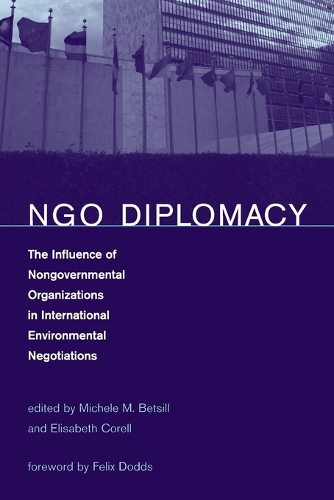
NGO Diplomacy: The Influence of Nongovernmental Organizations in International Environmental Negotiations
(Paperback)
Publishing Details
NGO Diplomacy: The Influence of Nongovernmental Organizations in International Environmental Negotiations
By (Author) Michele M. Betsill
Edited by Elisabeth Corell
Foreword by Felix Dodds
MIT Press Ltd
MIT Press
5th October 2007
United States
Classifications
Professional and Scholarly
Non Fiction
363.70526
Physical Properties
Paperback
264
Width 152mm, Height 229mm, Spine 11mm
431g
Description
Provides an analytical framework for assessing the impact of NGOs on intergovernmental negotiations on the environment and identifying the factors that determine the degree of NGO influence, with case studies that apply the framework to negotiations on climate change, biosafety, desertification, whaling, and forests.Over the past thirty years nongovernmental organizations (NGOs) have played an increasingly influential role in international negotiations, particularly on environmental issues. NGO diplomacy has become, in the words of one organizer, an "international experiment in democratizing intergovernmental decision making." But there has been little attempt to determine the conditions under which NGOs make a difference in either the process or the outcome of international negotiations. This book presents an analytic framework for the systematic and comparative study of NGO diplomacy in international environmental negotiations. Chapters by experts on international environmental policy apply this framework to assess the effect of NGO diplomacy on specific negotiations on environmental and sustainability issues. The proposed analytical framework offers researchers the tools with which to assess whether and how NGO diplomats affect negotiation processes, outcomes, or both, and through comparative analysis the book identifies factors that explain variation in NGO influence, including coordination of strategy, degree of access, institutional overlap, and alliances with key states. The empirical chapters use the framework to evaluate the degree of NGO influence on the first phase of the Kyoto Protocol negotiations on global climate change, the Cartagena Protocol on Biosafety, the United Nations Convention to Combat Desertification, negotiations within the International Whaling Commission that resulted in new management procedures and a ban on commercial whaling, and international negotiations on forests involving the United Nations, the International Tropical Timber Organization, and the World Trade Organization. Contributors Steinar Andresen, Michele M. Betsill, Stanley W. Burgiel, Elisabeth Corell, David Humphreys, Tora Skodvin
Reviews
"The chapters collected in this volume provide a rich set of cases and an important and original theoretical framework for studying the impacts of NGOs on international environmental politics. It should be widely read and assigned in courses on global environmental politics, social movements, international organizations, and politics. In particular, questions of actual NGO influence on international politics are critical to the fields this book addresses and have not yet been addressed by other works, especially to the degree of methodological rigor that this book attains."Kate O"Neill, Department of Environmental Science, Policy, and Management, University of California, Berkeley "The chapters collected in this volume provide a rich set of cases and an important and original theoretical framework for studying the impacts of NGOs on international environmental politics. It should be widely read and assigned in courses on global environmental politics, social movements, international organizations, and politics. In particular, questions of actual NGO influence on international politics are critical to the fields this book addresses and have not yet been addressed by other works, especially to the degree of methodological rigor which this book attains."--Kate O'Neill, Department of Environmental Science, Policy, and Management, University of California, Berkeley -- Katherine O'Neill "Without doubt, this book will become the new standard in efforts to explore the roles that NGOs play in international environmental negotiations."--Oran Young, Bren School of Environmental Science and Management, University of California, Santa Barbara -- Oran Young "Without doubt, this book will become the new standard in efforts to explore the roles that NGOs play in international environmental negotiations."Oran Young , Bren School of Environmental Science and Management, University of California, Santa Barbara
Author Bio
Michele M. Betsill is Associate Professor in the Department of Political Science at Colorado State University. Elisabeth Corell, the Wallenberg Fellow in Environment and Sustainability at the Swedish Institute of International Affairs from 2001 to 2006, is currently an independent scholar. Steinar Andresen is a Senior Research Fellow at the Fridtjof Nansen Institute in Norway. Michele M. Betsill is Associate Professor in the Department of Political Science at Colorado State University. David Humphreys is Senior Lecturer in Environmental Policy at The OpenUniversity. He is author of Forest Politics- The Evolution of International Cooperation (1996) and was a "resource person" to the World Commission on Forests and Sustainable Development. He co-edited (with Alan Thomas and Susan Carr) and contributed to Environmental Policies and NGO Influence- Land Degradation and Sustainable Resource Management in Sub-Saharan Africa (2001). Michele M. Betsill is Associate Professor in the Department of Political Science at Colorado State University. Michele M. Betsill is Associate Professor in the Department of Political Science at Colorado State University. Elisabeth Corell, the Wallenberg Fellow in Environment and Sustainability at the Swedish Institute of International Affairs from 2001 to 2006, is currently an independent scholar. Elisabeth Corell, the Wallenberg Fellow in Environment and Sustainability at the Swedish Institute of International Affairs from 2001 to 2006, is currently an independent scholar.
